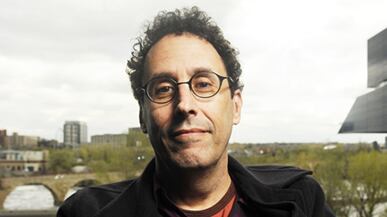What’s a left-wing radical to do when the hope of revolution fades and all that remains is a state of perpetual ennui?
In Tony Kushner’s new play, The Intelligent Homosexual's Guide to Capitalism and Socialism with a Key to the Scriptures, an aging American communist decides that the answer to this question is suicide and gathers his children (a middle-aged gay man having an affair with a hustler; a lesbian who turns out to have questions about her own sexuality; and a more burly, contractor son) at his Brooklyn brownstone in hopes of getting them on board with his decision.

“The play is centered around and brooding over the question of evolution versus revolution,” Kushner said over breakfast on a recent morning. “It reflects a certain struggle I have in my own life and in my own mind and heart about the nature of political change and the role that the dream of revolution has played in the life of the left in this country.”
It’s not exactly light stuff, but then Kushner has never shied away from tough topics.
In 1993, he became a theater world star with Angels in America, an epic about the early years of AIDS. In 2001, just weeks after Osama bin Laden’s minions carried out the deadliest terrorist attack in U.S. history, Kushner’s Homebody/Kabul debuted, casting a fascinating perspective on the West’s troubled relationship with Afghanistan. (He’d been at work on the play for almost four years when the World Trade Center was hit.)
When Hollywood called on Kushner—as it inevitably did—it was for serious fare like Munich, Steven Spielberg’s epic about a group of men who were hired by the Israeli government to assassinate the terrorists responsible for a massacre of Israeli athletes during the 1972 Summer Olympics. When CUNY decided this week not to give Kushner an honorary degree, because of alleged statements he’d made about Israel, he wrote an impassioned letter to the board of trustees ( PDF), defending his position, accusing them of slander, and demanding an apology. (More on that in a minute.)
Should it be a real surprise that in his mid-50s Kushner would grapple as an artist with the question of how to maintain the fire in the belly? For one thing, he’s a gay activist who has watched his own civil rights struggle shift from the live-or-die quality of the early AIDS years to something more middle-of-the-road. For another, he’s a writer who’s gone from being a theater world up-and-comer to a respected elder statesman who is frequently described as the most talented living playwright.
“What I’m struggling with in the play is that I don’t believe the dream of revolution is to be mocked or rejected.”
“I don’t think the play is autobiographical in any literal or naturalistic sense,” Oskar Eustis, the head of the Public Theater (where the play opened last night), said in a phone call. “But it’s autobiographical in a spiritual or thematic sense. The characters are going through the same struggles Tony is going through as a man, which is how to combine our own principles and theoretical values and beliefs with the flawed and fallen nature of our human actuality. And I think Tony has an extremely poignant sense of both our individual inadequacies and our class inadequacies, our difficulties as a progressive people in fulfilling our ideals, and our difficulties as individuals living up to them.”
On the day I met him, at a restaurant on the Upper West Side near his home, Kushner was wearing a button-down shirt, corduroys, and his signature round black glasses. A wedding band (from his marriage to the writer Mark Harris) adorned his ring finger, and his hair, once famously all over the place, was cut short. If he didn’t seem professorial, it’s partly because he continues to run around the city with a backpack, the kind you’d find on a kid working in an Apple Store.
He was talking about his own discomfort at how quickly his friends turned on Obama. “Instantly, before the inauguration had even taken place, it became ‘oh he’s betrayed us, ‘oh he’s so terrible,’” Kushner said. “Well, it’s very important to criticize the president no matter who the president is…but the impatience, and what feels like to me underneath the impatience to be a kind of comfort with powerlessness and a discomfort with power, was astounding…You have to make really horrible compromises [as president]. You have to swallow a sense of pride, not to the point where you’ve given up true north but…I feel this guy has done an amazing job keeping the country functioning, asking people to invest imaginatively in the processes of Democracy.
“He’s not a grand-stander, he’s not somebody who sees his main task as being the making of speeches. Turning this around is…Herculean. I think we can accomplish it, but this has been 40 years of the build towards Reaganism, and 30 years of Reaganism plain and simple. And what I’m struggling with in the play is that I don’t believe the dream of revolution is to be mocked or rejected, it is a dialectic of progress as in all things of how we move forward, but I just feel the rejection at the end of the Sixties of the notion that real change can come through democratic means through this electoral system was an absolute catastrophe for humanity.”
Not everyone appreciates his changing outlook, his idea that the world is flawed and that the ends do sometimes justify the means.
Recently, for example, Kushner has been at work on a script for Spielberg about Abraham Lincoln (another politician who has helped teach Kushner about the reality of “horrible compromises”). The day Kushner accepted the offer to do the screenplay, he went to lunch with Larry Kramer, the theater world’s other most prominent gay activist and playwright. Kramer has long believed Lincoln was gay and quickly began trying to persuade Kushner to include this in the screenplay. When Kushner demurred, the relationship between them busted up, with Kramer all but calling Kushner a sell-out and a liar for suggesting Lincoln might not have been gay, at least as we define it today.
Of course, it’s pretty hilarious, the idea of a friendship breaking apart because of something so academic. But the feud also speaks to the essential difference between the two men: Kramer was the artist who saw his own fight for civil rights as his central mission in life, while Kushner came to view it as being part of a larger struggle.
Kushner continues to rile people on the right. Not 24 hours before The Intelligent Homosexual’s Guide was due to open came the dispute with CUNY. The whole thing happened when a board member who’d previously worked for former New York governor George Pataki voiced an objection to Kushner’s selection, claiming he held anti-Israeli views.
While it is true that Kushner has been fiercely critical of the country’s treatment of Palestinians, he has also been remarkably consistent about its right to exist. Speaking with The New York Times on Thursday, Kushner said, “I have been honored many times by prominent Jewish organizations, proudly identified as a Jew and maintained a passionate support for the continuous existence of the State of Israel…An apology should come from the board of trustees for not following the dictates of simple fairness and decency when this happened, and allowing someone who deserved better treatment to be treated shabbily.”
Eustis said this most recent episode reveals that Kushner is as passionate and committed to his principles as ever. “This is his opening week. Do you think he wants this? Of course he doesn’t. But he knows that he can’t be silent. To be silent is to give consent.”
As Eustis put it, “I don’t think Tony’s mellowed so much as matured. Nothing about his ideals have softened, but he is part of the tradition that also believes you are measured by what you get done… In this play, more than any of his others, he gives you no answers. He simply lays bare a series of contradictions that I as a leftie know are at the heart of my life. And I think the compassion he has with human weakness is what makes him a great artist in addition to being a great thinker.”
Jacob Bernstein is a senior reporter at The Daily Beast. He has also written for New York magazine, Paper, and The Huffington Post.




